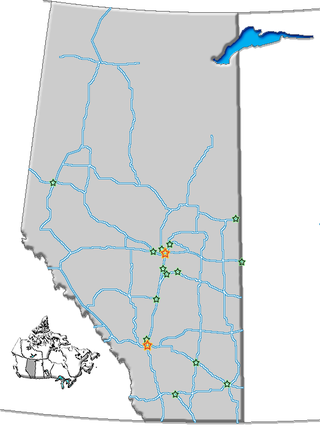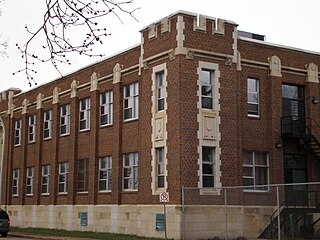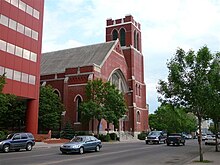
Old Strathcona is a historic district in south-central Edmonton, Alberta, Canada. Once the commercial core of the separate city of Strathcona, the area is now home to many of Edmonton's arts and entertainment facilities, as well as a local shopping hub for residents and students at the nearby University of Alberta. The district centres on Whyte Avenue and has shops, restaurants, bars and buskers.

Mewata Armoury is a Canadian Forces reserve armoury in Calgary, Alberta, Canada. Mewata ( is derived from the Cree word ᒥᔭᐋᐧᑕᒼ, meaning "Oh, be joyful".
Strathcona was a city in Alberta, Canada on the south side of the North Saskatchewan River. Originally founded in 1891, it amalgamated with the City of Edmonton in 1912.

Provincial historic sites of Alberta are museums and historic sites run by the Government of Alberta.

Saskatoon station is a historic railway station building in Saskatoon, Saskatchewan, Canada. It was built in 1908. It was designated a National Historic Site of Canada in 1976, and has also been protected as a Heritage Railway Station of Canada since 1990.

South Edmonton station, known as Strathcona station prior to 1932, was built by the Calgary and Edmonton Railway in what was then the City of Strathcona, Alberta. Construction on the station was started in 1907, completed in 1908, and expanded in 1910.

The Grierson Centre, also known as Grierson Institution, is a minimum security prison and historic site in Downtown Edmonton, Alberta, Canada. The institution is operated by the Correctional Service of Canada.

Lougheed House, or as it was originally known Beaulieu, is a National Historic Site located in the Beltline district of Calgary, Alberta. Originally constructed in 1891 as a home for Senator James Alexander Lougheed KCMG PC KC and his spouse Isabella Clarke Hardisty, the structure has since become an iconic heritage building in Calgary. Lougheed House is operated by Lougheed House Conservation Society, an independent, non-profit society devoted to the restoration and public enjoyment of the historic house and its Gardens.

The Land Titles Building was a federal government office built in Edmonton in 1893. It later became the Victoria Armoury, and was used by three Edmonton regiments. It is "likely the oldest existing Land Titles Office in Alberta, one of the oldest extant buildings in the province, and certainly the first purpose-built registry office".

The Ritchie Mill is the oldest surviving flour mill in the province of Alberta.
In Canada, heritage conservation deals with actions or processes that are aimed at safeguarding the character-defining elements of a cultural resource so as to retain its heritage value and extend its physical life. Historic objects in Canada may be granted special designation by any of the three levels of government: the federal government, the provincial governments, or a municipal government. The Heritage Canada Foundation acts as Canada's lead advocacy organization for heritage buildings and landscapes.

Calgary City Hall, is the seat of government for Calgary City Council, located in the city's downtown core of Calgary, Alberta, Canada. The historic building completed in 1911 serves as the offices for Calgary City Council, consisting of the office of the Mayor, fourteen Councillors and municipal Clerk. Calgary City Hall originally housed the municipal council and portions of administration from its completion in 1911 until the construction of the Calgary Municipal Building adjacent to Old City Hall in 1985, which currently houses the offices of 2,000 civic administrators.












